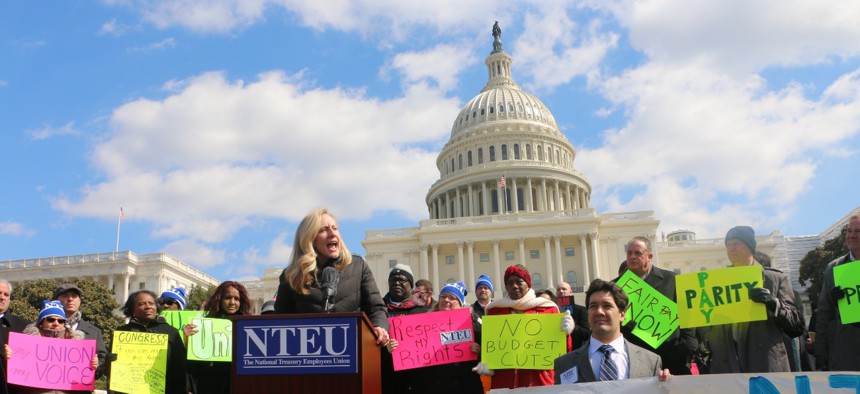
Rep. Abigail Spanberger, D-Va., speaks at an NTEU member rally in March 2019. FLICKR USER Rep. Abigail Spanberger
NTEU to Push for Pay, Benefits, and Protections in 2021
National Treasury Employees Union National President Tony Reardon said that he has seen a “mixed bag” in terms of agency efforts to comply with President Biden’s workforce executive order.
The National Treasury Employees Union, which represents federal employees in dozens of departments and agencies across government, will focus its lobbying efforts this year on improving employees’ pay, protecting their benefits and due process rights, and ensuring their workplaces are safe from COVID-19.
At the union’s annual legislative conference, NTEU National President Tony Reardon celebrated the end of a Trump administration that attacked both civil servants and the unions that represent them, but said much work remains to undo the damage of the last four years. This year, Reardon said the union will focus its lobbying on four key priorities: improving federal employee pay and benefits, ensuring feds are safe from COVID-19 when they return to federal facilities, reinforcing civil service protections and increasing agency funding after years of the Trump White House seeking to slash departmental budgets with varying degrees of success.
“While I don’t know exactly what the Biden-Harris budget will say, I think it is pretty safe to conclude it will not come out of the gate with $54 billion in cuts like we saw from the previous administration,” Reardon said. “We’re going to be pursuing funding increases at nearly all of the agencies we represent, but especially at the IRS and Customs and Border Protection. It is only with adequate funding levels that employees will have the resources they need to do their jobs.”
NTEU has endorsed legislation in Congress that would provide an average 3.2% pay increase to civilian federal workers next year. And Reardon said it will push lawmakers to pass legislation preventing future presidents from unilaterally creating new job classifications in the excepted service after President Trump’s failed attempt to strip thousands of federal workers of their civil service protections by converting them to a new Schedule F.
“We’re already seeing legislation that would further insulate the civil service from efforts to weaken or politicize it,” he said. “Rest in peace, Schedule F. But we want to make sure we don’t ever come that close to ruining the civil service again.”
Reardon applauded President Biden’s swift action to cancel Schedule F and rescind President Trump’s executive orders that tried to make it easier to fire federal workers and severely restricted how unions could represent their members, including by limiting the scope of collective bargaining negotiations and cracking down on the use of official time.
“We are in the process of making sure agencies are undoing the damage those EOs did, but to be honest, I will say that some agencies have been more proactive than others on this,” he said. “OPM and the Biden administration clearly ordered agencies to fix these problems, so the onus is on them to get it done now.”
On the one hand, NTEU officials lauded the leadership at the U.S. Patent and Trademark Office for its haste in restoring collaborative labor-management relations.
“USPTO took a very hard line under the EOs in 2018, but I’m pleased to announce that we have already settled all of our outstanding issues relating to the executive orders,” said Jay Besch, president of NTEU Chapter 245. “PTO is already rescinding the arbitrary caps on official time that limited my ability and representatives’ ability to represent our employees, and we’re fully returning to the contract that was in place prior to the EOs.”
But Reardon said the Health and Human Services Department has thus far failed to take action to rescind the Trump executive order provisions, and said that Acting Secretary Norris Cochran has not responded to multiple letters Reardon sent inquiring about the issue.
“I find it staggering that President Biden put out an executive order, that was followed up by guidance from OPM on how agencies should implement the contents of that EO, and yet we have someone leading—in an acting capacity—but leading a federal agency and not adhering immediately to what the president of the U.S. did,” Reardon said. “So I haven’t heard at all from Mr. Cochran. And our chapters have been getting the same kind of treatment. HHS has been intransigent and haven’t really indicated in any way that I have seen or heard that they’re acting in any way that would suggest that they’re ready to start doing the right thing.”
Despite his frustration, Reardon said he recognizes there are reasons some agencies might be slower an others.
“In some agencies, I think maybe it’s the culture of the agency, and I do think that some of it is really that it takes a little bit of time,” he said. “I do think we have to recognize on some level that we have a new administration, and consequently new leadership and it does take a little bit of time. I don’t assign in every situation some ill intent . . . I will tell you that in most agencies, however, when we do reach out and ask, ‘Hey, what’s going on,’ we at least get a response.’”







